Text
FF14 Battle Portrait Tutorial
For the past few weeks I was trying to find a way to recreate the battle portrait from FF14 as there was a few characters that I want to see in that style but don't officially have one yet. I think I got it down more or less (see image below) so I thought it's a good time to share what I did.

First of all, I made a few files that would help make life a little easier. They can be grabbed here .
Note: I did use Reshade to do a bit of work at the screenshot stage to help speed up the process but the same effect can be recreated in Photoshop with a vanilla screenshot. There are a lot of tutorials on how to do comic/cartoon effect in photoshop and those would make good bases to work off of.
Step 1: Take the screenshot with the PortraitBase Shader on. I usually take two screenshots. One with "Comic" on and one with it turned off. This is so that I have more to work with if needed.


Step 2: Drag all the screenshots into photoshop and remove the background. In photoshop, arrange the layer so that the screenshot with the Comic lines visible is on top of the one with the effect off.
Step 3: Duplicate the the layer with the "comic" effect and apply Blur->Gaussian blur (radius 0.5)
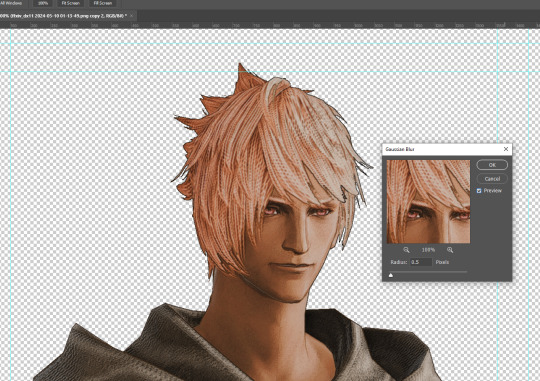
Step 4: Take a look at the hair. In Eric's case, It still doesn't look blur enough to me so I used the blur tool and blurred it a bit more
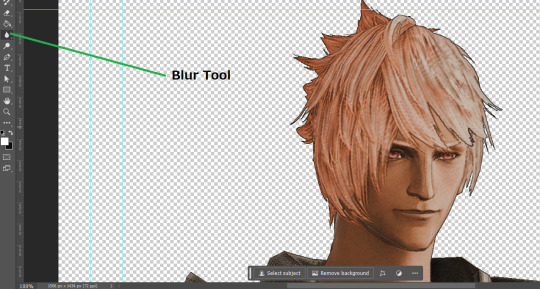
Step 5: Create a new layer above the layer in the previous step and use the brush tool to start outlining the edges. Where to outline is up to you but the idea is to make edges defined so that it looks more like a drawing.

Step 6: Duplicate the outline layer and then hide that layer. Step 7: Merge everything under the outline layer. Step 8: Drag and drop the "Texture.png" into the project and Clip it to your character layer. Set the blending of the texture to "soft light". Step 9: Drag and drop the "stroke Texture.png" into the project and Clip it to your character layer. Adjust the size till you are happy then set the blending to "overlay". Step 10: Adjust the opacity settings of both texture layers until it looks good to you.
Step 11: Click on your character layer and go to image->Adjustments->Hue/Saturation (note: you will see I dragged in the official Hades portrait as a point of reference to work off of). Adjust the saturation till you are happy.
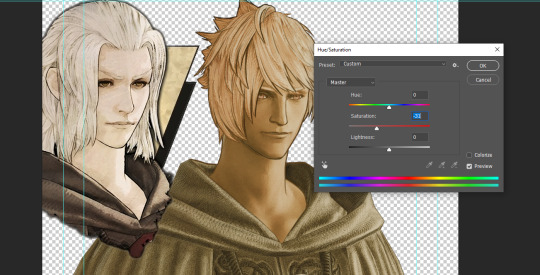
Step 12: Go to image->Adjustments->Color Balance and adjust the color till you are happy. In this example, since Eric is also wearing the Sophist robe, I tried to match that color to Hades' Sophist robe color.
Step 13: Once you are happy, drag the "Template.png" into the project and scale that to the size you want. Make sure it is completely covering the character. If it's not, you can just use paint more of it with the brush tool to extend it till it covers everything.

Step 14: Hide the "template.png" layer and select your character layer. Use the magic wand tool to select the outside of the character.
Step 15: With the selection still selected, click on the "Template.png" layer and press delete on your keyboard. You should now be left with a blank in the shape of your character.

Step 16: Drag the"Template.png" layer to be below your character layer. Then click on your character layer and clip it.
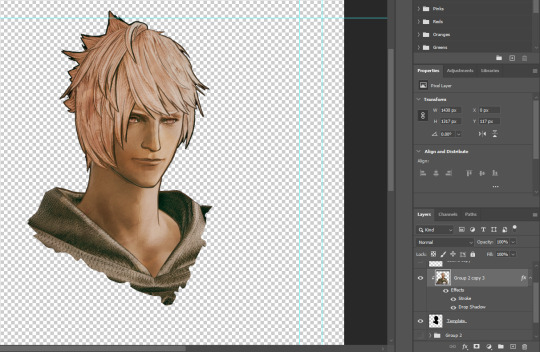
Step 17: Click on the "Template.png" layer and add a 2px stroke and shadow to it.
Step 18: Drag "Back_Deco.png" into the project and place it behind your character. Scale it till you are happy with it.
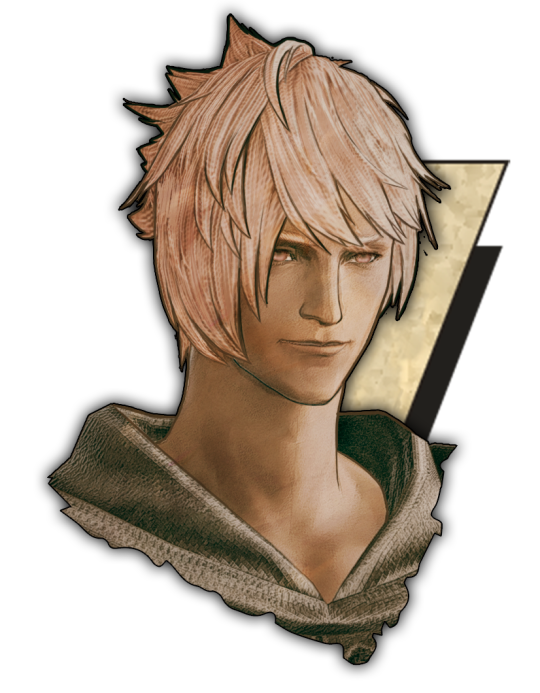
And that's it! Now you can recreate portraits for any NPCs that you want (in theory). A lot of it is also fine tuning to what you want but this should at least give you a decent base to work off of :)
2K notes
·
View notes
Text
On Elementals, Accountability, and Criticism
A few months ago, I made a post that gained a lot more traction than I expected. It started out as more of a joke about an ill-conceived mentality within the fandom, where certain players think their Warrior of Light should be allowed to kill off the Black Shroud's elementals.
But over the course of several days, my activity feed was suddenly swarmed with notifications. The post had unintentionally reignited preexisting fandom discourse about the elementals, Gridania, and flaws in the game's writing.
And before I knew it, I'd spent several weeks writing an essay about the elementals, since I wanted to use the opportunity to better explain my original post's stance.
While the original essay was posted as a reply, I feel it works better as its own post. I had a lot of fun researching and writing out my thoughts on this, and I hope it might contribute positively to the larger discussion within the fandom.
What is an Elemental?
To start off, I think it’s important to go over the nature of FFXIV's Elementals. I think understanding them physically and ecologically is crucial to understanding their place in the story, as well as proving that they’re existence isn't the unaddressed mystery some people think it is.
According to Encyclopedia Eorzea I & II, elementals are naturally occurring beings that are almost solely comprised of aether. They usually don't have the complex body structures seen in other lifeforms, and are considered "semi-intelligent" in regards to their level of sentience (E.E. II, pg. 269).
A misconception I sometimes see is that elementals are an exclusive entity to the Black Shroud. But the reality is that elementals exist in various forms all over Etheirys.


As the above reference pages show, there are various types of natural elementals, many of which players encounter regularly throughout various maps and instanced battles/dungeons. Furthermore, carbuncles, egi, and faeries are also classified under this category, as they are also constructs of pure aether — essentially man-made elementals.
Because aether is the "building block" for all life, lands rich with aether will be wellsprings of vitality, while areas where aetherial flows are disrupted or cut off see atrophy in the environment (Encyclopedia Eorzea I, pg. 8). The Black Shroud's simply an area known for its prominent and powerful population of elementals.
In Gridania, the Shroud elementals are associated with Nophica the Matron, their patron goddess. This is described as them having "been sprung from Her essence", implying that they are a part of her and enact her will (E.E.I, pg. 112).
However, it's important to remember that this isn't history, but rather mythology specific to Gridanian traditions (E.E. I, pg. 112). Both elementals and Nophica independently predate these traditions, and Myths of the Realm provides great insight into just how significant that time gap is. G’raha mentions that the Twelve were worshiped even back in the Third Astral Era — approximately five thousand years before the start A Realm Reborn (E.E. I, pg. 24). He also theorizes at the time that the Twelve are even older than that, which is confirmed by Eulogia following the completion of Thaleia.


The reason I even bring up Nophica at all is because of the frustration directed towards her by certain players. There seems to be a trend where fans forget to separate the true Nophica from her Gridania-specific myths, causing them to treat her like an irresponsible parent who refuses to discipline her young children.
But Nophica isn't the elementals' actual creator. They aren't actually a part of her, and nothing they do is by her will, the same way Halone never actually hated dragons and was deeply saddened by the Dragonsong War. Demanding that Nophica "control" the elementals' behavior is like demanding a forest ranger "control" the wildlife in a national park.
Personally, I've always viewed the elementals as animals deified in worship — an opinion I believe is supported by what we know about them from the lore. Associating nature, plants, and animals with the divine is a reoccurring part of real-world religions, such as we see with ancient Egyptian gods or koi in Chinese mythology. Gridanian reverence of the elementals follows a similar formula: a naturally existing creature becomes associated with the divine in specific cultures and mythologies.
How Does One "Talk" to Elementals?
As established in the lore books, certain types of elementals possess the potential for "communication". This is an ability usually exclusive to the following beings:
Spoken: Any intelligent creature that possesses an independent language that can be interpreted by another spoken of a differing genus, including but not limited to all of the game’s playable races and the myriad non-playable races (E.E. I, pg. 288).
Voidsent: Beings from the 13th shard of Etheirys who are warped by their shard’s umbral aether and the shard’s lack of ambient aether (E.E. I, pg. 296). This is a more conditional contender, as only select Voidsent have the ability to speak.
But this "communication" is significantly different from traditional language or spoken words. A difference Kan-E-Senna made clear during the main Heavensward storyline, when WoL and company approached her for help in rescuing Y'shtola from the Lifestream.

Kan-E's statement helps further clarify the biology of Shroud elementals; not only do they lack corporeal bodies, but also the common biological senses we associate with humanity. They don't have eyes (hence why Y'mhitra had to present as a aetheric reference to find Y'shtola), and they also don’t possess the auditory systems to perceive spoken words and languages.
Which leaves the crucial question: how do you "talk" to a being that doesn't possess the senses for that form of communication?
The answer is to utilize the only thing that the Shroud elementals can perceive: aether.
To help refresh my memory on this topic, I decided to replay the conjuror/white mage quests, along with referencing the encyclopedias for more regarding Gridanian Hearers. They made for great reference about crucial elemental lore, particularly the Gelmorran origins of humans "speaking" to elementals.

Because elementals don't actually speak and can't hear the voices of spoken races, "dialogue" between man and elemental is more like a muddled psychic connection. The term "Hearer" describes conjurors with a natural sensitivity to the elementals' aetheric waves — a sensitivity that the vast majority of the population doesn't possess.
While similar in their rarity and status as "gifts" in-universe, elemental sensitivity is uniquely separate from the Echo. The Echo's "power to transcend words" is a passive ability that can fully break most language barriers, creating an "internal understanding" of another’s intentions (E.E. I, p. 15).
Hearers, on the other hand, must actively manipulate aether when connecting emotionally with elementals. It took fifty years to develop this technique and requires more effort and proper training, but it's still not as precise or accurate as what the Echo's able to do. Any "words" a Hearer translates are rough interpretations of the elementals' intent — a well-known flaw in the process that's noted in the side story True of Heart.

Hearer sensitivity to the elementals can vary depending on the individual. Some are better at "listening" to certain types of elementals over others, like the guest instructors in the conjuror quests who instruct the WoL in their specialties.



Other Hearers are simply more attuned to the Shroud elementals' aether overall. Padjali Hearers usually possess the strongest sensitivities, which is why the Seedseer — the leader of the Hearers and the Seedseer Council that governs Gridania — is almost always a Padjal (E.E. I, p. 116). But even Seedseers aren't viewed as infallible; their "conversations" with elementals are also, at best, interpretations. These limitations are why Kan-E chose to share the role with her younger siblings, and why protocol for the Seedseer Council is to share their readings with each other, as different Hearers can end up with different interpretations.
A lot of this information comes to mind when I consider how elementals interact with spoken races in the game. It seems quite clear that elemental communions are meant to be portrayed as imperfect. The average person within the setting doesn't possess the ability to "speak" with them at all. Even trained conjurors and white mages don't always succeed in their communions, since frightened/agitated elementals aren't always easily "spoken" to.

Because of these factors, it really doesn't surprise me that characters have been hurt/killed because of elementals. I absolutely think a situation like that would be horrifying to find oneself in. But to me, it's not the same kind of terror that comes from a deliberate attack of spite — more like the terror of being caught in a stampede that you know you have little chance of outrunning.
Why "Evil" Elementals Aren't a Thing
Discourse about the Shroud elementals is nothing new in this fandom, and I think it's pretty clear that I disagree with people who think their WoL would be justified in slaughtering them.
Are the elementals gentle and harmless little creatures? No.
But they're also not some nefarious supervillain cabal plotting the demise of humanity.
I understand that getting vaporized by an angry nature spirit is a terrible way to go. But I think the reason why elementals lash out tends to fly over some people's heads, so they just assume that everything they do is out of human-adjacent hatred or disdain.
As you might expect, elementals are extremely sensitive to aetheric disturbances. FFXIV has never shied away from bringing up the dangers of aetheric imbalance; too little aether can turn environments into barren wastelands like the Burn, while too much of a specific aspect can warp not only souls, but corporeal forms. Raya-O-Senna explains the elementals' instincts in the white mage quests, and how they value aetherial balance over anything else.

Given the nature of their existence, it makes sense that elementals would crave aetheric harmony above all else; corruption and stagnation could easily lead to not only the destruction of their forest home, but also themselves. Like many wild animals in the real world, the elementals will prioritize their survival; they'll lash out the exact same way an animal who feels cornered or threatened would.
The Shroud elementals also don't single out spoken races with this behavior. They dislike any aetheric disharmony, regardless of whether the cause of that is man-made or natural. The conjuror quests even show that their agitation can be caused by other elementals; they're just as vulnerable to aetheric corruption as any other living creature, hence why those that are corrupted must be purged in order for the forest to heal.
Despite this, there are many fans who are hostile towards the Shroud elementals, and the language they use to express that disdain definitely stands out to me as part of the problem. Whether labeling them as immature “toddlers" or comparing their actions to human abusers, these players tend to heavily vilify elementals, painting them as the intentional architects behind Gridania’s biggest problems.
But these kinds of descriptors can't — and shouldn't — be applied to ANY type of elementals. They're human descriptors. Including ones for human children that are based on understandings of human development.
To treat the Shroud elementals like "toddlers" is to incorrectly apply human traits to beings that don't possess them. They are not human children, nor is there any known "childhood" phase of their life cycle. They are not creatures that grow and develop the way that human children do; they are naturally formed clusters of aether, many of which are older than any of the game's living characters. They don't do what they do because they're immature, or lack a parental figure to teach them "right" from "wrong".
I also don't agree with comparing their actions to intentional abuse. Again, there are canon events of elementals attacking humans, and those events would absolutely be scary and traumatizing. But it's also scary and traumatizing for someone to be mauled by a tiger, or to permanently lose an arm or leg in an unexpected shark attack.
Elementals aren't children throwing an unpunished tantrum, or abusers attempting to control their victims. These comparisons inaccurately associate their animalistic traits with human behavior. A correlation flawed by the fact that elementals aren't humans and don't think like them.
Would you call a grizzly bear evil or abusive for attacking a human that startled it in the woods?
Would you call a swarm of wasps immature or childish when they start stinging indiscriminately, and for not recognizing the difference between the person who disturbed their nest and those who just happened to be nearby?
Would you use these terms to refer to any of the aggressive creatures throughout in-game regions when they chase after/attack you, all because you got just a little too close while on your way to another location?
We can't predict what wild animals are going to do or control how they react to our presence in their space. Once one perceives you as a potential threat or meal, you are at risk of being attacked. It's why part of the respect we should show wild animals involves keeping a safe distance and respecting their territory.
The simple reality is that Shroud elementals aren't, never were, and never will be human. They are nature spirits living far outside the realm of human society, and canonically don’t possess the same sentience level as any of the game’s spoken races. They're a naturally occurring species that are deified in Gridania's Nophica mythology. They're alive, but the lore and game show that they behave more like wild animals.
This is why it's kind of frustrating when fans demand humanity — and human morals — from the elementals. The same way you can't explain the human condition to a butterfly or a redwood tree, you'll also never be able to explain it to a little cluster of pure energy floating out in the woods.
Nature is beautiful. Nature is terrifying. It's the comfort of a sunny day and a cool breeze. It's the destruction wrought by earthquakes and tornadoes. It's the budding life of beautiful plants and flowers. It's death in the piercing jaws of a predator, even if that prey is only a baby.
Nature is not bound by human concepts of morality or fairness. To expect it to abide by our rules is absurd, and to try and force it to is futile. And whether certain players like it or not, the elementals are irreversibly tied to that philosophy.
The Importance of Gridania's Self-Accountability
Like many others within the fandom, I find that the game's writing for Gridania has been painfully neglected compared to the other city-states. As a black fan, it’s vexing when fictional narratives don't handle the subject of racism with proper diligence and respect. While not every Gridania-related quest is bad, there are far too many that drop the ball; all too often, these quests fail to properly denounce in-universe prejudice, often to the detriment of the stories they’re trying to tell.
These problems are major motivating factors in my desire to rewrite several Gridanian questlines. I've made several posts about my ideas for a Lancer Quests rewrite in the past, and at some point, I hope to do the same for other questlines in need of reworks.
But while I'm desperate for the writing team to reevaluate Gridania's narrative, I find myself equally frustrated with the "Evil™ Elementals" crowd – mainly because I feel like they're failing to fully grasp the actual root of the problem.
The players I'm referring to are weirdly insistent on pinning all the blame on the Shroud elementals. In these fans' minds, it's these semi-sentient nature spirits who hate Duskwights, Moon Keepers, and Ala Mhigans, and they are the ones who instilled these prejudices into hateful members of Gridanian society.
Honestly, this stance has always been absurd to me, and I can barely understand how it came to exist. Especially since it’s so incompatible with the actual lore for the elementals.
I've already pointed out that the elementals can't perceive spoken languages, and that they "see" other life and living creatures the same way they "see" themselves — as aether.
Furthermore, it's canon fact that a Hearer's "translations" are not direct or word for word. They're readings are based completely on the Shroud elementals' aetheric waves, and this process shouldn't be mistaken for the Elementals knowing or understanding human words.
The names of different races and nationalities would mean absolutely nothing to elementals. They wouldn't perceive the pointed ears and tall stature of an Elezen, or the cat-like ears and tails on Miqo'te. They wouldn't be able to tell the difference between Midlander and Highlander, Duskwight and Wildwood, or any other clan distinctions that in-game characters or players can.
The Shroud elementals aren't capable of telling the differences between any spoken races.
Which means that if a Hearer claims the elementals dislike a specific race or clan, that Hearer is unquestionably spouting a bold-faced fucking lie.
There was already a situation like this in the 60-70 Leatherworker quests, which several people brought up in the tags of my original post. After showcasing a taxidermy dhalmel to raise awareness about endangered species, the WoL, Atelloune, and Enion are confronted by Hearer Marmaduke (yes, that’s actually his name and I’m honestly still not over it).

Not long after his tangent, he orchestrates the unfair seizure of the dhalmel. But Atelloune, suspicious of his claims, had already gone to the conjuror's guild, exposing Marmaduke's claims of elemental anger as a completely fabricated event.

Some might say that this isn't relevant because Marmaduke's lie wasn't told with prejudice in mind. But in the end, his motivations really aren't the most important thing here.
He openly lied about the elementals being angry, and seemed to have full confidence that he wouldn't be called out on it. He actively took advantage of his position — and the trust Gridanian citizens place in the Hearers — to falsely claim that something was wrong and force his misguided opinions onto others. Hell, I'd even argue that his behavior qualifies as a microaggression, since Atelloune is a Duskwight Elezen who he accused of a "crime" that never even happened. Not being a full blown bigot doesn't make someone incapable of racist behavior or actions (just like in real life).
This is not an incident that should be brushed off so easily. Sure, Marmaduke might have admitted to his own wrongdoings and ignorance. But the idea that this is an isolated incident within Gridania — that it's never happened before and somehow will never happen again — just comes off as terribly unrealistic.
Gridania is a five-hundred-year-old nation. How many times in those five hundred years has prejudice warped "translations" of the elementals?
How many Duskwights, Moon Keepers, and Ala Mhigans have been accused of infractions that never even occurred?
How many Hearers have abused their positions for everything from politics to petty squabbles? And how many times has someone gotten away with telling these kinds of abhorrent lies?
These are the kinds of questions the writing needs to tackle more with Gridania. Exposing the cracks within their system — and how those cracks have caused harm to innocents — will help to trigger the development and growth the city-state still desperately needs. Throwing all the blame on the elementals will never allow Gridania's narrative to escape stagnancy. At least not in a way that will actually feel genuine or satisfying to explore.
I understand that most people aren't trying to absolve Gridania of wrongdoing. But whether they realize it or not, that’s exactly what the "Evil™ Elementals" mentality does.
To claim that the elementals "made Gridanians racist" is to disregard the deliberate and intentional actions of racist Gridanians. It minimizes their level of accountability and responsibility in fixing those problems.
A prejudiced Hearer is not a gullible victim being strung along by scheming or "evil" nature spirits: they are intentionally taking advantage of their standing in society to persecute people that they don't like. They know the elementals don't understand the concept of spoken races, ethnicities, or nationalities. They also know that most of the population can't "hear" the elementals at all: a fact that can be utilized to mischaracterize the reasons for their agitation, or even fully fabricate incidents of anger all together.
One of my favorite parts of Myths of the Realm was Halone’s personal advice to the WoL.

This statement is so appropriate for Halone, especially considering Ishgard's history. But it's just as applicable to any other worshipers of the various gods.
A Hearer misrepresenting the "will of the elementals" is in the same vein as an Ishgardian priest misrepresenting the "will of the Fury". The game has so many examples of Ishgardians trying to use Halonic doctrine to not only justify their ignorance on certain subjects, but also enact unfair punishments onto others — including their own countrymen. Similar situations of false invocation have happened in Gridania, particularly when specific races and immigrants are unfairly targeted because they’ve supposedly "angered" the elementals.
This is why many fans — myself included — will make comparisons between Gridania and Ishgard. The citizens of both city-states are deeply devout to their patron goddesses. But that faith has been regularly misused and manipulated to persecute innocents and maintain unfair systems.
The Holy See's theocracy sanctioned generations of pointless bloodshed in a war they didn't want to admit they started. The Inquisitors killed countless of their own citizens based on flimsy accusations of heresy. Temple Knights have attacked and slaughtered Au Ra because they ignorantly and incorrectly assumed they were connected to and/or descended from dragons. If Ishgard can commit to reform and reparations after a millennium of atrocities, then Gridania is just as capable of taking the same accountability.
What the writing team needs to do is rethink their Gridania-centric storylines: not only do future questlines need to show more growth and change in their society, but older quests that were sloppily resolved need to be reexamined and even rewritten.
I don't agree with the claim that the writers have "written themselves into a corner" with the elementals. There's plenty lore that could be used to finally push Gridania in the right direction: they've just failed to utilize it effectively and consistently. It wouldn't be an easy task to go back and rework so much content. But in my eyes, it would be a major step forward in repairing these narrative problems.
True accountability for Gridania is taking responsibility for their own mess. No excuses. No justifications. No "the elementals made me do it". They need to establish better safeguards for their people — especially their minorities — and better checks and balances to prevent and punish blatant abuses of power.
Changing their city-state for the better will require long-term effort and commitment to reform. Not someone's WoL causing a mass extinction — which would certainly do more harm than good — and then demanding an entire nation bend to that WoL's will and abandon their beliefs. The former is Gridania taking actual responsibility for themselves; the latter echoes colonizer rhetoric and the racist ideologies these players claim to be criticizing.
FFXIV Fans and Constructive Criticism
To close this out, I'd like to shift focus to a fandom trend I've noticed for some time now.
Final Fantasy XIV is a major source of comfort for me. Besides just being a fun game to play, it's done wonders for my creative motivation, especially when it comes to my WoL and the fun I've had in building her lore.
However, there are also plenty of things about FFXIV that I'm critical of. There are class and job quests that fumble their stories (or at least falter at specific parts). Characters like Moenbryda and Ysayle were squandered in favor of lackluster "shock value" deaths. Certain quests in past expansions have come off as tone deaf to their subject matters, so much so that the script feels insanely out of character for everyone in the scene.
Criticism is important. It’s not pessimistic or ungrateful of the audience to engage critically with media, especially when it's media they love. My criticisms of FFXIV's writing don't diminish my love for the game. If anything, I want the writing to be reevaluated and improved, and for the writers to learn to avoid the same issues in the future.
But constructive criticism — at least to me — requires certain responsibilities. Responsibilities that not everyone keeps in mind before making sweeping judgements.
A good example is a certain "critique" I've seen repeated many times, usually during Stormblood discourse that tends to pop up from time to time. It relates to Lyse (a character who's regularly hypercriticized), and players who dislike how the writers gave her Raubahn's rightful place as leader of Ala Mhigo and the Resistance.
A rather odd complaint to have, considering it's about an imagined event.
Raubahn is Ala Mhigo's head of state, as well as head of the Resistance forces. Lyse commands only one faction of the Resistance — the faction based in Rhalgr's Reach — because that was the one under Conrad's command, and he had no authority over any other faction.
In other words, these fans dislike a "writing choice" that wasn't made to begin with, failing to realize that the actual scenario is provided both in-game and in Encyclopedia Eorzea II.



This is just one of many examples where players will mistake false presumptions for canon. Someone will criticize the game for a plot point that never happened, and suddenly other players will like, share, and comment about how they also hated that thing that never happened.
Even on my original post, there were people making various claims about the elementals. Some were 100% accurate. Others were slightly off. Others still were flat out untrue.
In this fandom — and plenty of others — fan-created concepts have a bad habit of getting mixed up with the actual facts. I don't think most players do it on purpose; they're usually just trying to share their thoughts and opinions on the game, and that's something I'll never try to discourage. But sometimes, they'll simply accept something someone else said in good faith, or rely too much on memory for parts of the game they haven't played through in a long time.
Criticizing the writing's handling of Gridania is perfectly valid, and I've done plenty of it myself. But those criticisms need to be based on the writing's actual faults and mistakes: not on misremembered plot lines and assumptions. Complaints need to be backed up by actual examples from the game and/or other canon sources, and can’t rely solely on muddled memories of a play-through that happened months or years ago.
It took me over two weeks to put all this together. I spent hours replaying relevant questlines and reading the side stories and lore books, not to mention the time it took me just to write all of it down. But I did all that because I wanted to be able to back up my claims with evidence. I didn't want to leave out important context or dialogue that I simply forgot or missed early on. If I were to forget about key events and fill in those gaps with hazy recollections, I'd not only weaken my argument’s strength, but also be guilty of blaming a writer for something I misremembered.
No one's EVER going to remember everything that happened in FFXIV; it's literally impossible for a game this large and with so many characters and stories. The Unending Journey and New Game+ are fabulous tools to make up for this, as well as the dedicated wikis and websites created by our fellow fans. But all of those go to waste if players never bother to utilize them.
I'll always support constructive criticism in this and any other fandom. But good constructive criticism isn't just making loud accusations on social media. It's taking the time to revisit the story and take notes on the things that could be done better. It's providing evidence to support your claims and prevent misinformation from being spread as truth. It's addressing biases not only in the writing room, but also those harbored by fellow players.
Constructive criticism requires effort and diligence. A fact I feel gets lost in fandom spaces sometimes.
502 notes
·
View notes
Text

a random quick sketch of our team's characters from warhammer fantasy campaign
8 notes
·
View notes
Text

Morrowind.
No matter how many worlds I travel, I still return there sooner or later. There is no such absolute freedom and peace anywhere else.
376 notes
·
View notes
Text

Morrowind.
No matter how many worlds I travel, I still return there sooner or later. There is no such absolute freedom and peace anywhere else.
376 notes
·
View notes
Text
I had myself a thought on an aspect of life beneath the Order of the Elementals that I don't think I take great enough consideration of in RP
While it definitely isn't wrong to consider the hyperorthodox nature of Gridanians and natives of the Black Shroud to heed the word and law of the Elementals, I think we forget the true spirit of the law that the people of Gridania follow: that nature is fucking dangerous. I find myself too focused on the rigid adherence to the elementals, simply BECAUSE it is rigid, and funnily enough? I'm missing the forest for the trees. We hear dialogue of Hearers refusing to save a child in danger, because it is the "Will of the Elementals." And the Will was never "I decree that a child will be eaten by twenty dire bears"… But rather. "It is the literal rule of the jungle. You get to enjoy it's bounty, but this place is still THE JUNGLE."
The Law of the Elementals isn't even about the foundation of law: it is the ever diligent reminder and reaffirmation that no matter how far humanity may reach in their arts, technology, or civilization: you can never truly tame the wild that surrounds you. And to fail in recognizing the fierocity of nature is a sure path to certain doom.
Nature and it's savagery is the true reminder that to live is to suffer.
14 notes
·
View notes
Text

生日快樂 🪶 2 0 2 5
Thank you, to my friends and mutuals, for all the lovely sentiments you've been sharing this month. Yes, today is my actual birthday, and I really look forward to all the sparrow posts you've held onto until today.
I originally conceived the idea of Yein's sparrows being little guiding lights that seek out lost souls both living and not; a metaphor perhaps for the overwhelming desire to reach out and help as many people as possible. These messengers find us in our times of great need to deliver words we wish someone could offer at that very moment.
So take a sparrow with you, as your own little light. They will perch on your shoulder, hide in your pocket, or nest inside your bag. You may forget they're there on most days, but when your feet are weary and your head feels heavy, they will sing and chirp to you ⸺ and give you the determination to keep going.
You're doing so great, and someone's world is better with you in it.

172 notes
·
View notes
Text

Questing in the Urshilaku Burial Caverns: skeleton hunting, mummy identification, and many, many levitation spells
This area in the game is one of the many gems you are rewarded with for all the adventuring you do. You get so much environmental storytelling in here from the attention to detail in how the level is laid out. It's one of those moments where you understand why Morrowind is still beloved.
383 notes
·
View notes
Text
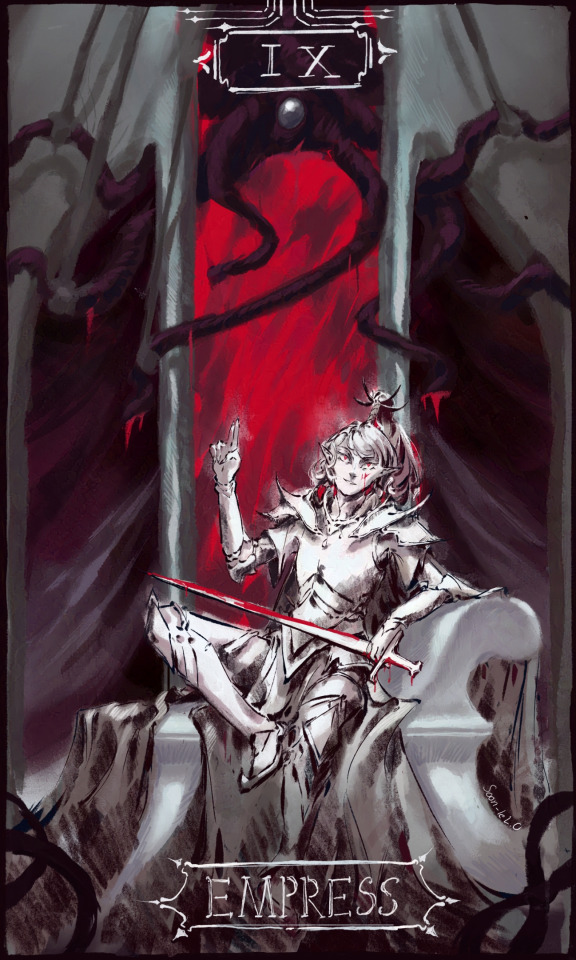
I was commissioned some time ago by a author to draw their character Raveres in a tarot card inspired image. She be regal and powerful but have the smugest face imaginable. She was to be styled after the emperess card with " I X " and "Emperess" marks and I was given refs regarding the pose. Except for those hardlines I was given a lot of freedome.

In the beginning I gravited towards to the idea of hee sitting on her throne and her true natuer of brutality literally radiating from behind her. As time went on I put more emphasis on the slayed kraken instead. Its an important event in story that Raveres takes pride in. I loved the imagery of it hanging limp above her as a thropey in her throne room.

Altered her pose and face through out the whole thing and got feedback from the author. The trick was to show her power but not make her too serious. Her leaning on her roman-eusq divine gave her such an carefree psychopath vibe. I took the liberty to make the fabric flow around her to give her that sense of queenlyness.

Before the final render I sent three versions for the author to decide on. We both favoured the ones with the burning background. It gave the vibe of Raveres holding back a storm of violence.

A big part of the process was throwing ideas back and forth with the author about what would fit Raveres. It lacks some of the details and technics of my newer stuff but I'm always gonna like this one.
Thanks for reading!
64 notes
·
View notes
Text

"Let me introduce you my best friend, chancellor Traytorr Sharkeeth, whom I trust with my life" - Lord Estoopyd the oft-stabbed
36 notes
·
View notes
Text

Firemoth Island
Art for The Elder Scrolls: Online
*Artist Unknown* If anyone knows the artist comment below
59 notes
·
View notes
Text

Old thing I forgor about completely, so I never posted it
2K notes
·
View notes
Text

Bolvyn Venim, Archmaster of House Redoran
He is a natural leader, born to rule. One only wishes he was just and fair as well as strong. — Athyn Sarethi, Redoran Councilor
423 notes
·
View notes
Text

has your journey been good? has it been worthwhile?
5K notes
·
View notes
Text
The cutest they've ever been. Obsessed.
Commish by @doxolove

60 notes
·
View notes
Text
So my area is on fire. The conditions down here are not exactly great. I have solar power as backup, but my internet is about as reliable as a Mentor on Chaotic towers.
Maybe I can answer some old asks I kept preserved within my inbox...
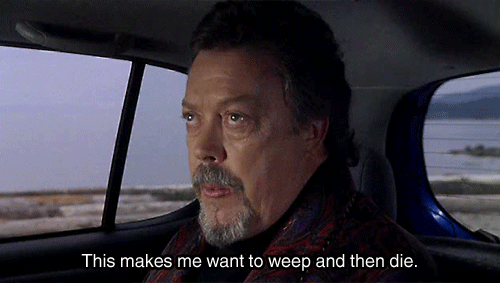
92 notes
·
View notes
